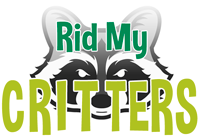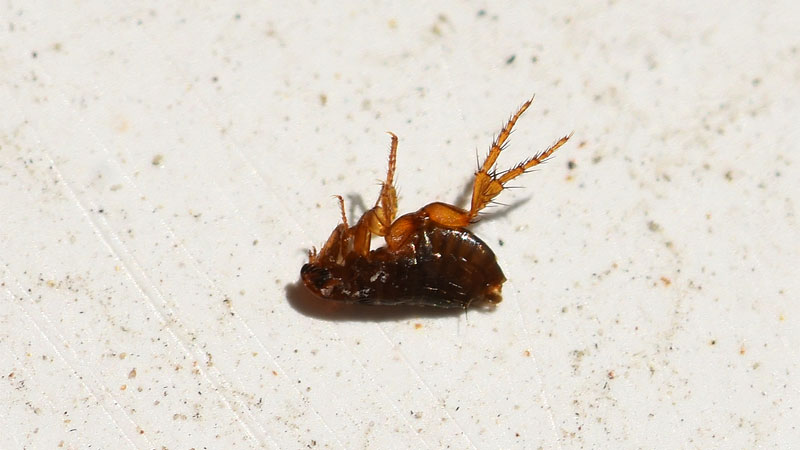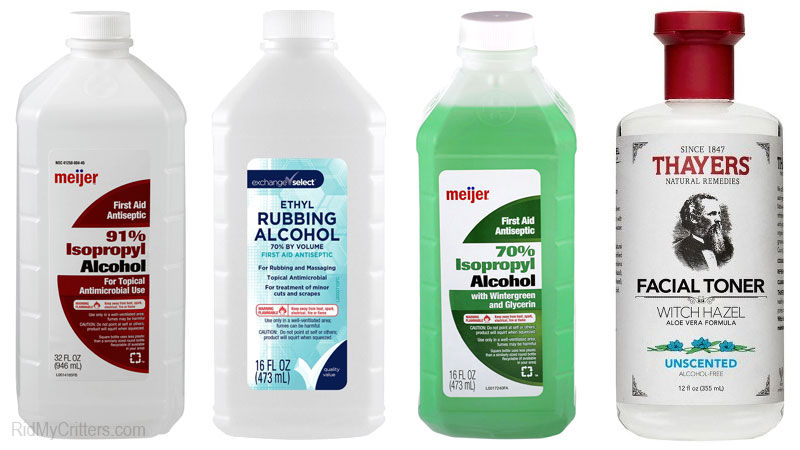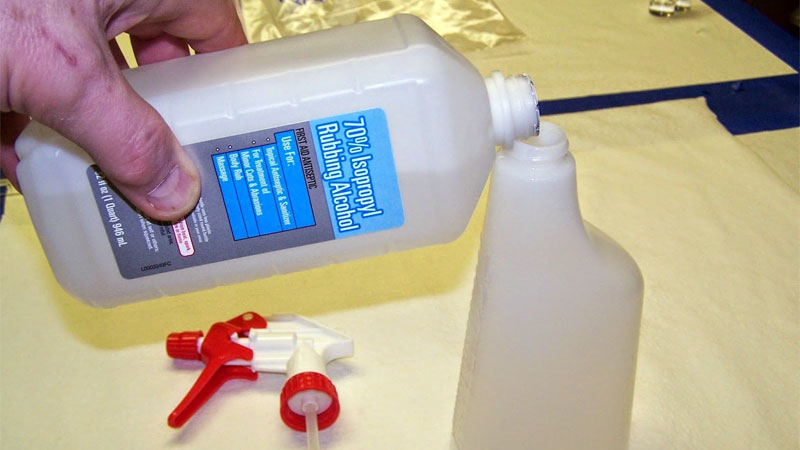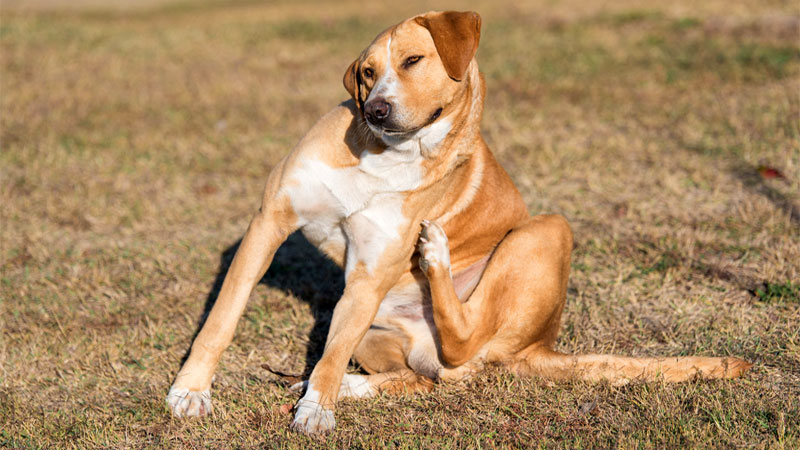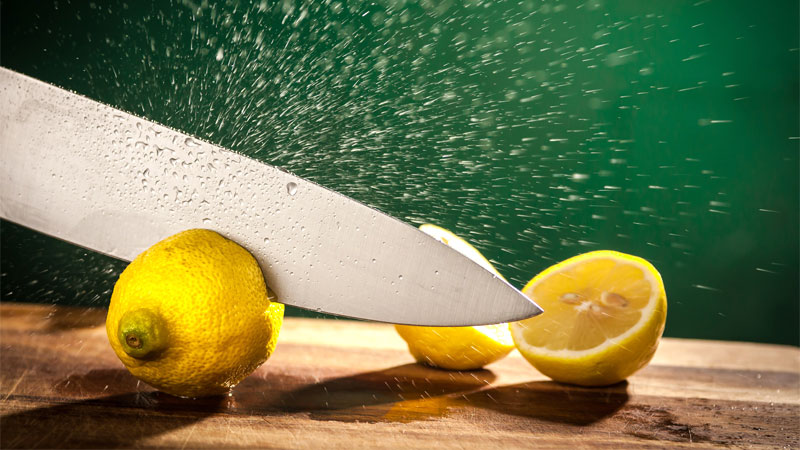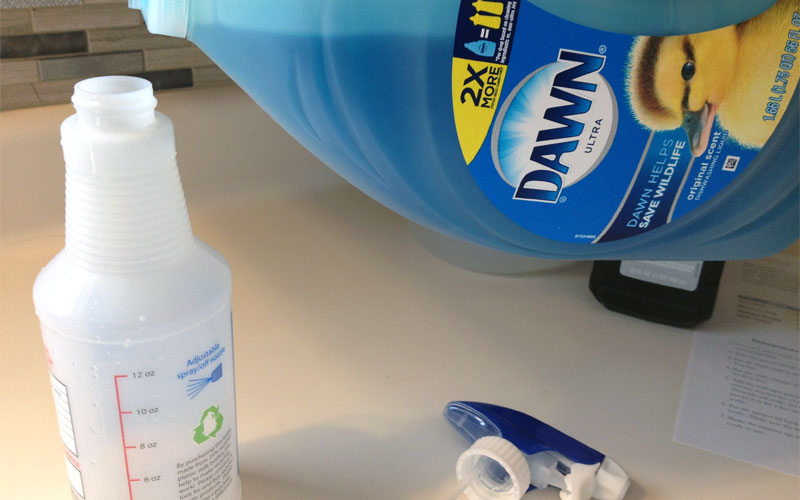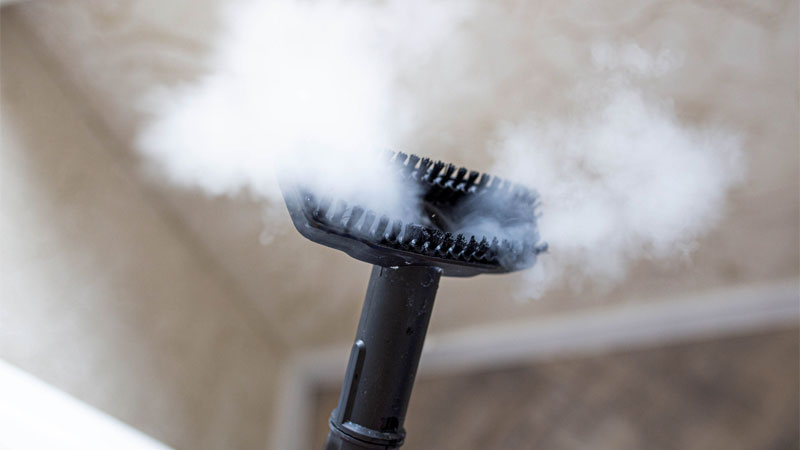Here at RMC, we’re all about home remedies, but we’re also painfully aware that a lot of them have mixed results or won’t work at all. One such popular home remedy is rubbing alcohol. This common household product and its close relatives have often been touted as a way to kill all sorts of critters, such as aphids and bed bugs.
But will rubbing alcohol kill fleas? Let’s take a closer look at rubbing alcohol (as well as isopropyl alcohol and witch hazel) and answer this question in depth.
Does Alcohol Kill Fleas on Contact?
Well the short answer is yes… and no. For the longer answer, we must first make a distinction between three different products which are often confused for one another. Then we’ll go into further detail about just how effective these products are.
Isopropyl Alcohol vs Rubbing Alcohol vs Witch Hazel
It’s a common misconception to try and use these three products interchangeably. However, there’s a huge difference between the three. Each one has different properties that affect their use against critters such as fleas.
Isopropyl Alcohol
Isopropyl alcohol is a powerful solvent most often used in industrial settings. The concentration is toxic on its own and can cause a number of negative side effects if applied to the skin.
This product can be found at drug stores in a diluted form that’s generally safe for topical use on humans. It’s also found in alcohol wipes, hand sanitizer, and rubbing alcohol.
Rubbing Alcohol
Speaking of rubbing alcohol, this product contains 70 percent denatured alcohol. This is most commonly isopropyl, but it can also be ethanol. It’s commonly used as a topical antiseptic as well as a cleaning solution. There is also a variant called isopropyl rubbing alcohol which contains 70 percent pure isopropyl alcohol.
Witch Hazel
Finally, witch hazel is a natural extract of Hamamelis virginiana that’s popular in treating a wide range of skin conditions as well as being used as a cleaner. It’s the most mild of the three and also generally considered to be the safest.
Unlike the others, witch hazel can generally be used on textiles without discoloring them. It’s even used by pet specialists such as vets to clean up blood.
Why is This Important?
As you can see, rubbing alcohol sits right in the middle in terms of strength and safety. Mixing these products up can damage items, harm your pets, and will have different degrees of effectiveness.
So now that we know these important differences, we have a much better set of questions to ask: Can rubbing alcohol kill fleas, is it a dead-end remedy (no pun intended), or are people actually mixing up these products?
Can Alcohol Kills Fleas?
Under the right circumstances, alcohol does indeed kill fleas. Let’s look at all three types to see how they stack up against flea infestations.
How Effective is Rubbing Alcohol for Fleas?
The big argument for using rubbing alcohol against fleas is its ability to dehydrate the fleas, killing them. While this is certainly true, the effects aren’t instantaneous and there’s a lot of risk involved.
For example, rubbing alcohol is highly flammable, so getting it everywhere is just asking for trouble. Also, it’s toxic to your pets if they ingest it. Even worse, the alcohol has to make direct contact with the flea to be at all useful, and it can discolor fabrics in the process.
A popular recipe is to mix equal parts rubbing alcohol and water with a few drops of liquid soap to help it stick. Spraying this all over the house may kill some fleas, but can’t be used where fleas congregate most – on your pets. All in all, this is a better remedy than mothballs, but not by much.
Will Isopropyl Alcohol Kill Fleas?
Isopropyl alcohol is even more powerful than rubbing alcohol and is a solvent. This means it will not only dehydrate the fleas, it will partially dissolve them on the inside. However, all of the same drawbacks that rubbing alcohol suffers from also apply here.
Add to that a very strong alcohol smell that can be harmful if you inhale the fumes and it’s obvious why you shouldn’t use it as a flea treatment.
Can Witch Hazel Kill Fleas?
So what about witch hazel, which is the most mild of the three? Well the good news is that you can safely spray your pet’s bed, your bed, or other furniture.
The downside is it’s not as effective as the other two and will still require direct contact to have any effectiveness at all.
Life Stages and Resistance to Alcohol Treatments
One last important note about this remedy is the fact that it won’t affect all stages of the flea life cycle equally.
- Flea larvae are by far the most vulnerable but also very hard to hit with a spray bottle.
- The pupal stage has a bit more protection, but a direct hit will still prove fatal.
- Adult fleas take time to kill and some may survive even a direct hit with an alcohol spray.
- Finally, flea eggs are the most resistant, with a far lower rate of success.
Again, the risks far outweigh the potential benefits. You’ll also need to make sure fleas are the real problem as there are various critters that look like fleas but aren’t.
Are These Treatments Safe for Use on Cats and Dogs?
And now we come back to the biggest problem with using these products as a flea killer. Both rubbing alcohol and isopropyl alcohol are highly toxic to your pets and shouldn’t even be used on them topically.
Witch hazel can potentially be used on large dogs in very small amounts (as in a cotton swab), but it’s still risky if they ingest it. Small dogs and cats are small enough that ingesting even a tiny amount could cause serious damage or even be life threatening.
So does rubbing alcohol kill fleas on dogs? Yes, but it can also harm or kill your dog, making this a treatment to avoid.
Does Rubbing Alcohol Kill Fleas on Humans?
Thankfully, this trick can work on human skin, as some types of fleas actually prefer humans to pets. They’ll hang out in your hair and can thus be confused with other bugs. The good news is that both rubbing alcohol also witch hazel are commonly used on the human body as topical ointments. However, we wouldn’t suggest washing your hair in either.
Commonly Asked Questions Regarding Alcohol and Fleas
As you can imagine, we get asked a lot of questions by desperate pet owners looking for any possible way to make a treatment work. Here are some of the questions we’ve gotten over the years:
Does Alcohol Kill Fleas on Beds?
Yes, it can potentially kill fleas on both human and pet beds. Unfortunately, there’s a risk of discoloring any fabrics. It also leaves behind an odor that takes time to dissipate. You’re also going to be playing tag with the flea, who’s reluctant to get a toxic bath.
Does Hand Sanitizer Kill Fleas?
This is another yes and no product. Thanks to all of the mixed signals during the Covid-19 lockdowns, hand sanitizer is more common than cockroaches.
As they’re usually mostly alcohol, one would think they’d work just like straight rubbing alcohol. However, hand sanitizer really works by slowly drowning the flea and is thus no better than using soapy water.
Will Alcohol Kill Fleas on Carpets?
Yes, but only if you have direct access to the flea and stick to witch hazel. Obviously, a short carpet will be easier to work with than a shag rug. Also, if you use anything stronger than witch hazel, be ready for the carpet to suffer discoloration.
Will Alcohol Kill Fleas on Furniture?
Just like carpets, you can sometimes kill fleas on furniture, but need to be careful. Anything other than witch hazel can discolor upholstery, and may strip the varnish or other finishings on wood. As usual, the risks are generally greater than the potential benefits.
Alternatives to Using Rubbing Alcohol Against Fleas
Treating your pets can be a lot more difficult than your home in general. For example, you can’t use garlic because it’s toxic to your pets. Essential oils are also out of the question. And, as we’ve pointed out, alcohol can be dangerous to pets.
So what home remedies are available that will still work? Here are some options that are safe for your pets and tend to be at least somewhat effective.
Lemon Juice
A spray made with lemon juice won’t kill fleas, but it will make your house smell wonderful while also making fleas avoid the area.
Lemon juice is generally safe for use around your pets, and it’s not uncommon to add lemon juice to other ingredients that are more lethal to increase their effectiveness. More importantly, using a lemon juice spray can drive fleas temporarily from certain areas, making it easier to target them.
We’ve even heard of people soaking pet collars in lemon juice. Just remember, essential oils of other lemony-scented plants can be harmful on contact, so stick to lemon juice if you do this!
Soapy Water
By far, one of the most effective (and frustrating) treatments is the flea bath. A bath in warm, soapy water isn’t as effective, but it can still produce some great results. The goal isn’t to drown the fleas, it’s to dislodge them from your pet so they can be sent down the drain.
One option is Dawn dish liquid (original strength) diluted to 1/4. This is an option often used by professionals to strip excess oils from the fur of pets with sensitive skin. You need to be careful to dilute it so your pet doesn’t accidentally ingest enough to make them sick. However, it’s far safer than most flea bath options.
Using Dawn as a shampoo in conjunction with a flea comb can send fleas and their eggs into the water below. The downside is that Dawn can produce bubbles if there’s a lot of splashing, which the fleas can use to escape.
Another great option is Mane and Tail. This all-natural shampoo was originally made for horses and is available in a diluted form in most shampoo aisles. It’s perfectly safe for your pet and will help make their coat shiny and soft.
More importantly, it’s less likely to produce bubbles than Dawn. By the time your pet is done, the surface of your tub will look like someone sprinkled pepper all over it.
And if that’s not enough, these two products can safely be used on furniture and textiles. While they won’t necessarily kill the fleas, you can mix in some of that lemon juice to both clean and repel.
Steam Cleaning
There’s nothing like a commercial-grade steam cleaner to pull dirt (even flea dirt) from deep in your carpets and furniture. But did you know they also kill many pests?
You’ll want to use a commercial model over a regular one because the water needs to reach temperatures of 180 to 220 degrees. Running your steamer over places you’ve seen fleas will kill them in minutes and suck all of their stages up into the dirty water canister where they can be safely flushed.
Unfortunately, you can’t steam clean your pets, but this is a great option for just about everywhere else.
Diatomaceous Earth
Speaking of great solution that work wonders (just not on your pet), food-grade diatomaceous earth is a great option. This powder-like substance is essentially harmless to humans and pets (just don’t go snorting the dust!) while absolutely destroying bugs. This is because the powder is actually made from the crushed remains of diatom shells.
At bug level, it’s like walking on broken glass, destroying their exoskeletons and causing them to die of dehydration soon after. The dust is an irritant if inhaled, but proper usage means you can dust all sorts of places around the house. We wouldn’t suggest using it on your pet beds, but people have used it on their own beds before.
It works far better than flea sprays or other harsh chemicals. Just remember to use it responsibly.
Vinegar
White vinegar (not apple cider vinegar) is a great cleaning product that also repels fleas. Use it for cleaning and the smell will chase fleas off. Sure, your house will smell like a salad, but it’s generally safe for use around pets and is readily available.
Final Notes
While we love DIY methods of controlling pests, it’s also important to accept when certain methods either don’t work or are actually dangerous. Often, methods that work on fleas will also work on bed bugs, carpet beetles, and other small critters.
This means a lot of potential money saved. Unfortunately, the effectiveness of rubbing alcohol (and its sibling products) relies on a lot of luck. There’s also just too much that can go wrong.
Rubbing alcohol can still be a useful treatment for many plant pests, but when it comes to fleas, we strongly recommend giving it a pass. You’ll get much better results using an alternative method (like those above) or to simply contact a flea exterminator.
- How to Get Rid of Hawks - March 8, 2024
- How to Get Rid of Pill Bugs (Rolly Pollies) - March 1, 2024
- How to Get Rid of Groundhogs (Woodchucks) - February 5, 2024
